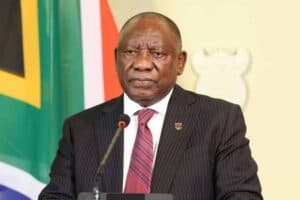The president addressed attendees during the Freedom Day celebration event at the Union Buildings, Pretoria, on Saturday.

President Cyril Ramaphosa says despite ongoing challenges, South Africa has improved significantly since the dawn of democracy.
Ramaphosa delivered his address at the Freedom Day celebration event on Saturday.
Speaking to hundreds of attendees at the Union Buildings in Pretoria, the president said notable strides had been made since 1994.
Tasked to bridge the divide – Ramaphosa
“Over the last 30 years, we have sought to implement policies and programmes that advance equality and human dignity in areas like economic empowerment, health care, social support, and the provision of basic services,” Ramaphosa said.
“Our task over the last 30 years has been to bridge the huge divides of wealth and opportunity in our country between black and white, men and women, and between urban and rural dwellers.”
“Even if they don’t like it, this country is no longer what it was under apartheid.”
ALSO READ: ‘Because they are unemployed’ – Ramaphosa slammed after gushing over support
Challenged, but thriving?
Despite South Africa’s political post-apartheid evolution, the country’s 30-year journey in democracy hasn’t been without turbulence. Issues of corruption, state capture, load shedding and high unemployment have hindered the country’s progress.
Nonetheless, Ramaphosa believes there are some noteworthy wins.
“Although we have faced challenges, both beyond our borders and here at home, our economy has tripled in size since 1994. While unemployment remains our greatest and most pressing challenge, the number of South Africans in employment increased from eight million in 1994, to over 16 million now.
“We brought electricity, water and sanitation to millions of South African homes.”
ALSO READ: WATCH: Lesufi urges Ramaphosa to sign controversial NHI Bill
‘Apartheid’s shadow continues to cast on our future’ – Ramaphosa
Meanwhile, the legacy of apartheid still lingers in the lives of many South Africans – including the country’s so-called “born-frees”.
“To those born after 1994, the impact and meaning of our democracy is very different from those who lived during apartheid. Yet apartheid’s shadow continues to cast on our future, and defines the choices and opportunities of so many South Africans,” Ramaphosa said in his speech.
South Africa remains among the world’s most unequal countries, marked by the uneven distribution of wealth – with the richest and poorest people existing within the same territory.
“We know that despite our achievements, South Africa remains a highly unequal society. Our people confront every day the apartheid legacy of unemployment, poverty and underdevelopment,” Ramaphosa noted.
“Despite great progress, many households do not have electricity or clean water. There are still many families which go hungry. There’s still a huge divide between the rich and the poor in our country.”
ALSO READ: ‘I was here to solicit prayers’: Cyril Ramaphosa says he didn’t visit churches to campaign
‘A nation of optimism’
Reflecting on the past and forging ahead, Ramaphosa acknowledged the negative impact of the country’s ongoing challenges, but encouraged South Africans to soldier on.
“Our journey since 1994 has proved that we are a nation of optimism, we are a resilient nation. We’re also a nation that has great hope.
“At times it seems that these challenges threaten to undermine the achievements we have made over the past 30 years. Yet we know, that if we work together, if we harness the same spirit of unity that we did in 1994, we will surely overcome these challenges that confront us.
“It is within our hands to rebuild South Africa, and make it a place of equal opportunity and share prosperity where no one is left behind.”
NOW READ: PODCAST: ‘I know what Zuma stands for but not Ramaphosa’: ACDP’s Meshoe on 30 years in parliament






